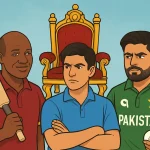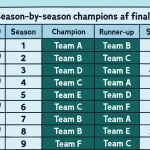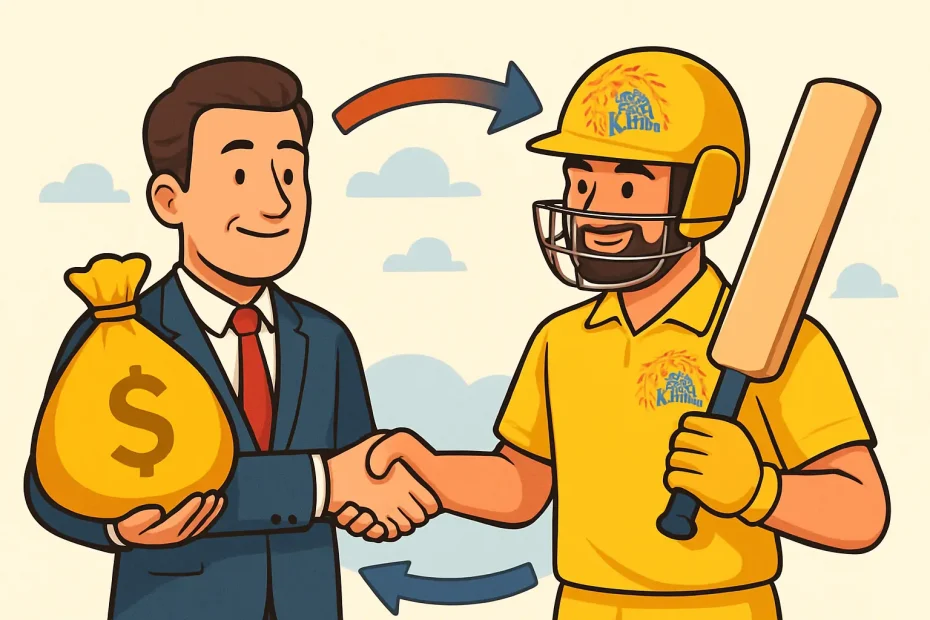Answer in one line: Chennai Super Kings is owned and operated by Chennai Super Kings Cricket Limited (CSKCL), an unlisted public company formed after the franchise business was demerged from India Cements. The promoter group is led by industrialist N. Srinivasan and his family, with K. S. Viswanathan serving as Chief Executive Officer. India Cements no longer directly owns the team, though the historical and personnel link is deep.
Quick answer
- Corporate owner: Chennai Super Kings Cricket Limited (CSKCL)
- Nature of company: Unlisted public company in India
- Promoter group: Led by N. Srinivasan and family
- Historical parent: India Cements (original franchise winner; later demerged)
- CEO: K. S. Viswanathan
- Common misconceptions: MS Dhoni does not officially own equity in CSKCL per public filings; India Cements is not the current direct owner
If you came for a clean, decisive statement—this is it. CSK is not “owned by a person” in the way some IPL teams are popularly described. The franchise belongs to a dedicated company, CSKCL, with a board, shareholders, financial statements, and an operational management that has built one of the most successful brands in Indian sport.
Ownership structure explained
The simplest way to understand the CSK owner story: think of a corporate shell built for cricket. CSKCL holds the IPL franchise rights, runs commercial operations, and oversees expansion into other leagues under the Super Kings banner.
- The entity: Chennai Super Kings Cricket Limited (CSKCL)
- Type: Unlisted public company registered in India
- Core business: Owning and operating the Chennai Super Kings IPL franchise
- Related sporting assets: Foreign league teams branded as “Super Kings” (notably Joburg Super Kings and Texas Super Kings), grassroots and academy programs, merchandise, licensing
- Leadership: A board led by promoter-directors and professional executives; the most visible faces are N. Srinivasan at the ownership level and K. S. Viswanathan in day-to-day operations
How CSKCL relates to India Cements
- Origin story: India Cements won the original Chennai franchise rights from the BCCI. That laid the foundation for the CSK brand.
- Regulatory evolution: As franchise cricket matured and governance norms tightened, the team operations were hived off from India Cements through a formal demerger process.
- End state: The cricket business sits in CSKCL, separate from India Cements’ cement operations. Shares of CSKCL are held by a broad base of investors, with a promoter group led by the Srinivasan family. India Cements, as a company, is no longer the direct owner of CSK.
A plain-English read: CSK was born at India Cements and then moved next door into its own house, CSKCL. The family is still next door; many of the people are the same; but the mailbox now says “Chennai Super Kings Cricket Limited.”
Promoters and board
- Promoter group: Led by N. Srinivasan and family, who are closely identified with CSK’s identity and strategic decisions.
- Board presence: Family promoters, senior executives with India Cements lineage, and independent directors. Operationally, this board empowers a seasoned sports management team.
- CEO: K. S. Viswanathan—universally addressed in cricketing circles as “Kasi sir”—anchors cricket and commercial operations. If you’ve watched auctions closely, he’s the calm, quiet presence who rarely breaks a sweat.
Textbook org chart (described)
- Top layer: CSKCL Board (promoter-led with independent oversight)
- Commercial and cricket operations: CEO’s office coordinating team management, sponsorship sales, marketing, stadium and ticketing, digital and content, licensing
- Cricket brain trust: Head coach and leadership group working hand-in-hand with analytics support and scouting networks
- Affiliates and subsidiaries: Entities formed to operate foreign-league teams and academies under the Super Kings label
From bid to brand: the ownership journey
The earliest days
A corporate bidder with a long footprint in Tamil Nadu industry put its weight behind a cricket dream. India Cements secured the rights to the Chennai franchise and aligned it with a vision that sounded simple then and now looks like a masterstroke: build a team with a long memory. Keep leaders, grow a culture, make the city feel like family. That was not a press release; it was a structural choice—ownership with patience.
Creating a dedicated company
As league rules and conflict-of-interest norms tightened and the business outgrew the founding structure, the CSK franchise operations were spun out of India Cements into a standalone cricket company. The mechanics involved a demerger scheme and a transitional trust to hold shares for distribution. When the dust settled, a new name sat on the ownership documents: Chennai Super Kings Cricket Limited. The shareholding widened beyond a single listed company; the promoter family retained strategic control; the management remained familiar.
A storm and a return
A darker chapter shaped the franchise and its governance rigor. The franchise was suspended for two seasons after a team official, Gurunath Meiyappan, was found involved in betting activity. Everyone inside the organization remembers the silence that followed—the empty summer, the training kits folded away. The return was the opposite of silence. A packed Chepauk howled the familiar tune; the old guard walked out as if time had bent. Those two missing campaigns did two things: they tested fan loyalty (it turned out to be unbreakable) and they reinforced the franchise’s vow to keep governance tight and the dressing room tighter.
Expansion under a single brand family
A trained eye can see the pattern today. CSKCL has nurtured not only a team but a brand architecture:
- IPL: Chennai Super Kings is the flagship
- SA-based T20 league: Joburg Super Kings carries the family DNA in another cricketing capital
- US-based Major League Cricket: Texas Super Kings opens a frontier market with local partners
- Development: Super Kings Academy expands the funnel of talent and the fan ecosystem
This is ownership as brand stewardship. The cricket is the point; the structure makes the cricket last.
The people behind the franchise
N. Srinivasan: the promoter in the room
To reduce him to a single role would be lazy. He is the industrialist whose company won the original bid. He is also the sports administrator with deep influence in Indian cricket’s corridors. He is the promoter who believes in continuity over clamor. In franchise rooms, people will tell you he is exacting, sometimes stubborn, always protective of the core. The spine of CSK—leadership continuity, clarity on roles, preference for readymade match temperament—mirrors that temperament. You may disagree with his style; it is hard to argue with the trophy cabinet and the brand equity.
Rupa Gurunath: a promoter-director’s footprint
Rupa Gurunath, his daughter, is a promoter-director associated with CSKCL. Her profile straddles sports administration and corporate governance. Within CSKCL, she represents continuity and a family stake in the venture’s strategic direction. Public filings over the years show her as a significant shareholder, and she has been part of the organization’s steady hand in governance after the high-pressure phase of regulatory scrutiny.
Gurunath Meiyappan: the cautionary footnote
His name sits in the uncomfortable chapter of the franchise history. Found to be involved in betting activity, he was declared ineligible to participate in cricket-related activities. The consequences were severe for the team: two seasons on the sidelines. In a counterintuitive way, that episode forced the franchise to delineate lines of authority and oversight even more clearly. Ownership learned. Management learned. Fans endured and then roared.
K. S. Viswanathan: the CEO who prefers the shadows
Auctions are theatre. Everyone performs. Except the man who runs CSK. He sits quietly, eyes on the list, leaving the gesturing to others. It isn’t coyness; it is process. Inside the war room, he balances inputs from coaches, analysts, scouts, and the ownership’s appetite. A CSK bid is usually decisive. No frenzy. No last-second scramble. If they want someone, the paddle goes up with the certainty of a chess player moving a rook. The broader sponsorship machine—the relationships with long-term partners, the slow accretion of value around the brand—also owes much to a CEO who dislikes fuss and loves spreadsheets.
The cricket brain trust
Though the owner story is the focus, it’s impossible to explain CSK’s success without acknowledging the cricket room’s unity with ownership:
- A head coach who dislikes drama and hires assistants who listen first
- A scouting system that prefers temperament to hype
- A leadership core in the dressing room that treats the badge as a responsibility, not a thrill
Ownership is not just capital; it is an attitude that percolates down a chain. CSK’s chain is built on trust accumulated over many seasons, not a flavor-of-the-month staffing pattern.
IPL ownership rules and where CSK fits
You’ll hear a lot of confusion about “who is the real owner” across teams. Strip away the noise:
- Franchises are owned by legal entities (companies, LLPs, consortia). CSK’s owner is CSKCL.
- The company signs a franchise agreement with the BCCI. In exchange for operational rights, the franchise pays a fee to the board, typically calculated as a share of revenue.
- Governance norms prohibit conflicts of interest; cross-holdings and direct involvement must comply with rules. The CSK demerger from India Cements was aligned to these norms.
- Teams must maintain fit-and-proper owners and officials. After the disciplinary action that benched CSK for two seasons, the franchise re-entered with renewed compliance systems.
Financials and valuation: how much is CSK worth?
Revenue model in plain words
In Indian franchise cricket, teams make money from a blend of central distribution, sponsorship, ticketing, licensing, and prize money. CSK is a case study in optimizing each stream.
- Central income: The IPL’s media rights are the engine of the league. A large chunk is shared with franchises, roughly on an equal basis with minor performance variables. CSK’s share here is foundational.
- Team sponsorships: This is where brand power shows. Long, multi-season partnerships and a packed roster of category sponsors keep the top line healthy.
- Ticketing and match-day: Chepauk is a fortress not only in cricketing terms but in revenue terms. High occupancy, premium seating, hospitality boxes, and walk-in retail all add up.
- Merchandising and licensing: CSK’s yellow is a symbol. Jerseys, caps, accessories, even lifestyle collaborations, travel far beyond Chennai.
- Prize money and bonuses: Nice to have, never the plan. The plan is to get to the knockout phase so often that the season looks incomplete without it.
- International ventures: The “Super Kings” footprint in foreign leagues opens new revenue in sponsorship, local broadcasting, and ticketing, spreading risk beyond one tournament.
A quick reference table
| Category | Typical role in revenue mix |
|---|---|
| Central share from media rights | Largest single component |
| Team sponsorships | Strong second pillar; a CSK strength |
| Ticketing and hospitality | Reliant on home fixtures; Chepauk lifts CSK |
| Merchandising/licensing | Growing, with a loyal fanbase |
| Prize money | Variable; a bonus with brand halo effect |
| Foreign-league operations | Emerging growth vector |
Brand value vs enterprise value
Two numbers often get mixed up:
- Brand value: A consulting estimate of how valuable the “CSK” brand is in terms of marketing power and licensing. Think of it as the premium the name commands.
- Enterprise/value on the street: What investors in the private market think CSKCL is worth based on revenues, margins, and growth prospects. This shows up in the unlisted share price.
CSKCL’s private market valuation has repeatedly crossed the proverbial unicorn threshold by media estimation, buoyed by strong cash flows and a fanbase that advertisers love. Brand studies consistently put CSK among the top two in the league, often trading places with Mumbai depending on recent silverware and sentiment. The brand is not cosmetic; it is a sales pipeline.
Is CSK listed on the stock market?
- No. CSKCL is not listed on NSE or BSE.
- CSK shares do trade in the unlisted or pre-IPO market via private brokers who facilitate transfers between willing buyers and existing shareholders. This is a high-risk corner of the market—prices are volatile, liquidity is uncertain, and disclosure is not as immediate as in listed space.
- There is no officially announced IPO. The company is large and profitable enough to consider one; whether it chooses to list is a strategic call involving ownership preference, regulation, and market timing.
How to think about CSKCL’s unlisted shares
- Access: Transactions typically run through specialized unlisted-share brokers, investment desks, or platforms that aggregate sellers. Directly approaching the company for fresh issuance is not an option for a retail buyer.
- Process: KYC, demat transfer, and stamp duty compliance apply. Settlement risk is real; only work with regulated intermediaries of repute.
- Risks: No daily price discovery, limited exit avenues, price gapping between trades, and potential for rumor-driven quotes. If you must, think in multi-season horizons.
- Dividends: CSKCL has paid dividends in past financial periods; treat them as a bonus, not the investment thesis.
- Documentation: Track MCA filings, audited financials, and credible business media coverage to build conviction.
India Cements and CSK: what stake today?
- The company that originally won the franchise does not hold the team on its books today.
- The promoter family behind India Cements remains central to CSKCL.
- Some India Cements shareholders received CSKCL shares during the demerger process, widening the base beyond a single corporate balance sheet.
Sponsors and commercial partners
A sponsorship roster tells you who believes in the brand. CSK’s partner list over time features blue-chip names across automotive, industrials, consumer goods, paints, fuel, cement, financial services, and tech. The front of the jersey has carried heavyweight logos; sleeves and back are typically sold to repeat partners who appreciate the team’s consistency. Training kit, caps, and digital rights bring in incremental slots. Homegrown brands have often chosen CSK for a southern market push; multinationals see it as an India-wide reach vehicle.
Partners that have worked with CSK across different cycles include:
- Automotive and mobility brands with national distribution
- Long-time industrial partners rooted in the South
- Consumer brands aiming to crack Tamil Nadu with national spillover
- Fuel and lubricants companies with an eye on mass visibility
- Paints, cement, and allied categories where the India Cements lineage gives trust
Listing every current sponsor is less useful than understanding the pattern: CSK makes multi-season deals, prizes predictability, and trades at a premium thanks to a deliverable audience. Rarely will you see a revolving door on the jersey front; it is not the CSK way.
Case study: ownership philosophy and cricket decisions
Continuity isn’t a tagline for CSK; it is a spreadsheet row with a budget line. Ownership’s preference for experience and chemistry over momentary hype shows up in auction strategies and mid-season calm.
- Retention over churn: Much of the cap is committed to a core that knows each other’s rhythms. That costs money and requires faith.
- Auctions as patience auctions: CSK rarely floods the early lots. They wait, they sniff a slot, and pounce when comfort meets price.
- The “temperament test”: Scouting places a premium on players who handle crowd noise and heads-down roles. The number of times CSK has picked a seemingly unfashionable domestic pro and given him a runway is not an accident.
- Leadership in layers: On-field leadership is flanked by off-field clarity. Ownership’s interventions are minimal during a season; the chain of command is clean.
- Culture beats cosmetics: Training sessions look like old friends with new goals; the room is quiet, the eye contact constant. If you’ve stood at the edge of the practice square, you can feel a kind of industrial rhythm—repetition until it looks like ease.
Comparisons: CSK owner vs other IPL owners
Every franchise has a personality; ownership architecture is a big part of that personality.
- Mumbai Indians owner vs CSK owner: MI is owned by Indiawin Sports, part of the Reliance universe—deep corporate integration, global sports properties, and the resources of a conglomerate. CSKCL is a standalone unlisted public company with a promoter family and a professional CEO at the helm. Both invest in analytics, academies, and multi-league footprints. The difference lies in corporate structure and internal decision velocity; CSK’s is compact, MI’s is embedded in a bigger system.
- RCB owner vs CSK owner: RCB sits under a beverages and spirits giant. Marketing is splashy, brand identity strong, silverware elusive. CSK’s structure is quieter, its cricketing framework more settled. Different worlds; same tournament.
- KKR, DC, and others: Media-entertainment backing, diversified group control, or multi-investor consortia each stamp their styles. CSKCL’s single-sport focus and promoter-led board give it unusual clarity; the upside is cohesion, the downside is dependence on long-term leadership continuity.
Legal and history notes you should know
- Why was CSK suspended? The team was suspended for two seasons due to the involvement of a team official in betting-related activity, as found by an independent committee operating under court supervision. The punishment was collective; the lesson was systemic.
- Did CSK change ownership because of that? The demerger process and the clarified structure around CSKCL aligned with a broader shift toward cleaner, sport-specific governance and stricter conflict norms. The franchise’s return came with renewed lines of control and public demonstrations of compliance.
Does MS Dhoni own part of CSK?
This is the evergreen rumor. Fans want it to be true because it feels poetic. Publicly available filings do not list MS Dhoni as a shareholder of CSKCL. He is the face of the brand, a leader whose influence is beyond statistics, a de facto custodian of the CSK way—but not an equity owner as per company disclosures available in the public domain.
CSK share price in the unlisted market: what it signals
Follow the unlisted quotes long enough and you notice something: price strength tracks four variables—
- The league’s media rights trajectory
- The team’s on-field performance and knockout consistency
- Sponsor renewals and partner additions
- Talk of an eventual listing or corporate action
Prices spike on good seasons, drift in the off months, and swing when the rumor mill turns. If you are simply a fan, it’s a fun curiosity. If you are an investor, treat it as a patient, research-heavy space—one where you only buy what you understand and only with money you can sit on for seasons, not weeks.
CSK vs conflict-of-interest narratives
Much ink has been spilled over conflicts in Indian cricket. The CSK story sits at the intersection of corporate governance and fandom. The key points today:
- The owner is a separate cricket company with its own board.
- Franchise agreements and operational approvals are handled formally.
- Promoter presence is acknowledged and disclosed; the company functions with professional management on the ground.
You may have a view on the personalities in the room; the structure is what matters most. And the structure is robust.
PAA-style FAQs
Who is the real owner of CSK?
CSK is owned by Chennai Super Kings Cricket Limited (CSKCL), an unlisted public company. The promoter group is led by N. Srinivasan and his family. Operational leadership is with CEO K. S. Viswanathan.
Is CSK owned by India Cements?
Not directly today. India Cements won the original bid and later demerged the franchise business. CSK now sits in a separate company, CSKCL. The historical and promoter link remains, but the ownership is not on India Cements’ balance sheet.
What is Chennai Super Kings Cricket Limited?
CSKCL is the corporate entity that holds the IPL franchise rights for CSK and manages the team’s commercial operations, academies, and affiliated teams under the Super Kings brand. It is an unlisted public company in India.
Who is the CEO and who is the chairman?
CEO: K. S. Viswanathan. Chairman and key promoter voice: N. Srinivasan. A promoter-director, Rupa Gurunath, is also closely associated with the company.
Is CSK listed on the stock market?
No. CSKCL shares are not listed on NSE or BSE. They change hands in the unlisted market via private brokers. There is no announced IPO.
How much is CSK worth?
Private market estimates and brand valuation studies place CSK among the most valuable teams in the league, with a total enterprise value that has crossed unicorn territory by media accounts. Exact valuations shift with performance, media rights cycles, and market appetite.
Does MS Dhoni own a stake in CSK?
There is no public filing that shows MS Dhoni as a shareholder of CSKCL. He is the franchise’s most influential figure on the cricket side but not an equity owner according to available disclosures.
Why was CSK suspended?
Following an investigation into betting activities involving a team official, the franchise was suspended for two seasons. The team returned after serving the full period, with reinforced governance measures.
Who founded CSK?
The Chennai franchise was acquired by India Cements in the league’s inaugural auction. The CSK identity and brand were built by that founding owner and later transferred to CSKCL through a demerger.
What companies sponsor CSK?
The partner list has included prominent names across automotive, lubricants, paints, cement, finance, and tech. CSK gravitates toward multi-season agreements with repeat partners—one reason its sponsorship revenue is consistently strong.
Ownership timeline without the dates
- Franchise awarded: India Cements secures the Chennai rights and launches CSK.
- Consolidation phase: A string of strong seasons builds a fanbase and a brand that advertisers queue for.
- Governance shift: Conflict-of-interest norms evolve; the cricket business is hived off from the cement company into CSKCL.
- Crisis and reset: Disciplinary action sidelines the team for two seasons; management returns with stricter controls.
- Brand expansion: CSKCL plants the Super Kings flag in overseas leagues and opens academies, turning a team into a sporting ecosystem.
CSK revenue sources in context
CSK’s revenue mix is balanced, with a tilt toward central distributions and sponsorship. The franchise fee paid to the BCCI is a cost line carved out of gross income; efficient teams build commercial strength to widen operating margins.
Another quick table
| Item | What to know |
|---|---|
| Central distribution | Equal-share engine room of IPL economics |
| Franchise fee | Payable to BCCI; typically linked to revenues |
| Sponsorship | Largest controllable lever; CSK’s long-term partner strategy pays off |
| Ticketing | Strong at Chepauk; subject to schedule and capacity |
| Merch/licensing | Sticky with CSK’s fan culture; margin-positive at scale |
| Overseas ventures | Hedge and growth story; brand halo returns to the IPL flagship |
India Cements relationship with CSK explained
- Corporate evolution: India Cements birthed CSK. Later, CSK moved into CSKCL via a demerger.
- People continuity: Key executives with India Cements backgrounds remain part of CSKCL’s leadership and board environment.
- Shareholder flow: Many India Cements shareholders received CSKCL shares in the demerger, creating a broad investor base.
- Public misunderstanding: Fans often conflate “founder” with “current owner.” Today’s owner is CSKCL; India Cements is today a historical parent and a continuing influence via promoters.
CSK brand valuation, year by season (without the numbers)
- Early growth: Rapid fan capture; on-field consistency lifts brand rank into the top tier.
- Crisis dip: Suspension blunts momentum; goodwill protects the downside.
- Resurgence: Strong returns to knockout stages, iconic moments, and deep sponsor trust rebuild brand premium.
- Globalization: Foreign-league placements and academies create a larger surface area for the brand; valuations reflect this footprint.
- Present: Near the top of independent rankings, often vying with Mumbai for the crown in brand strength.
Beyond cricket: what ownership means to the city
Chepauk on a match evening isn’t a stadium, it’s a declaration. Street vendors in white veshtis peddling whistles, families in a sea of yellow filing past the marina humidity, and an inside joke every time a local lad gets a game—this is what a well-owned franchise amplifies. It isn’t just the payroll. Ownership chooses patience over panic; the team returns that faith with a style of cricket that occasionally looks like destiny.
The business also matters to the local economy—employment on match days, hospitality booms, small businesses with CSK merchandise pop-ups, ride-sharing spikes, the whole carnival. A franchise this woven into a city’s fabric requires an owner that understands more than EBITDA. CSKCL, for all the headlines its promoters attract, has put down roots where it counts.
How the ownership lens shapes scouting and retention
- Role clarity: Players often speak about knowing exactly why they’re in the XI. That clarity flows from the top. Ownership sets the tone; coaches execute.
- Late bloomers: CSK has a soft spot for proven domestic performers who might lack headline sizzle. Ownership backs such picks through rough patches.
- The “Chennai carryover”: An overseas player becomes a cult hero here for the quiet things—fielding through dew, bowling to a plan on small boundaries, batting with responsibility when the rate looks ugly. Those traits are scouted and valued in the first place.
- Captaincy and succession: Big calls are made behind closed doors. Speculation runs wild outside; inside, the plan is seldom impulsive.
csk owner kaun hai / csk owner in tamil
Hindi: CSK ka malik kaun hai? Jawab—Chennai Super Kings Cricket Limited (CSKCL). Is company ke promoter group ko N. Srinivasan aur unke parivaar lead karte hain. CEO K. S. Viswanathan hain.
Tamil: CSK ஓனர் யார்? பதில்—Chennai Super Kings Cricket Limited (CSKCL). இந்த நிறுவனத்தின் ப்ரமோட்டர் குழுவை N. ஸ்ரீனிவாசன் குடும்பம் முன்னிலை வகிக்கிறது. CEO K. S. விஸ்வநாதன்.
Note: These lines are included for language search intent; the legal answer remains the same in every language—the owner is CSKCL.
Common myths corrected
- “India Cements owns CSK.”
Not directly anymore. The owner is CSKCL. - “Dhoni has shares in CSK.”
Public filings do not show this. - “CSK is a private company with one owner.”
CSKCL is an unlisted public company with a broad shareholder base and a promoter group. - “Sponsors change every season because IPL is volatile.”
CSK’s sponsorship backbone is deliberately long-term; the variance is lower than at many teams.
What to watch next if you follow the owner angle
- Governance disclosures: Board composition, auditor notes, and related-party transactions give you a feel for the guardrails.
- Sponsorship roster: When a front-of-shirt changes or a mega-category joins, that is a leading indicator of brand health.
- Academy and grassroots expansion: Owners who invest in pathways tend to win the long game.
- Overseas league bets: How Joburg and Texas perform commercially—and how those learnings loop back into CSK—matters to CSKCL’s future revenues.
- Venue developments: Any enhancements at Chepauk that boost hospitality and premium seating will show up in match-day margins.
Owner vs franchise culture: a final reflection
There is a tempting way to talk about IPL ownership—with balance sheets, deals, and the gravitational pull of big names. All of that is real. But the soul of a franchise comes from choices repeated until they become muscle memory. CSKCL chooses stability. It chooses to back people who are low-noise and high-output. It chooses to exit storms without announcing a rebirth. That ownership DNA is why the team keeps finding itself deep in the tournament, season after season, even when the squad looks imperfect on paper.
In the stands, nobody chants for corporate forms. They chant for the badge. The paradox is that the cleanest corporate form—clear ownership, clean governance, professional management—creates the environment where the badge can mean something beyond just a color. That is the CSK owner story, stripped to the studs.
Key takeaways
- The owner of CSK is Chennai Super Kings Cricket Limited (CSKCL), an unlisted public company.
- The promoter group is led by N. Srinivasan and his family; India Cements is the historical parent but not the current direct owner.
- K. S. Viswanathan runs operations as CEO; the board includes promoter-directors and independent oversight.
- CSKCL’s value is anchored by central distributions, long-term sponsorships, strong match-day economics, and an expanding Super Kings ecosystem in foreign leagues.
- Shares trade in the unlisted market; no official IPO is announced; investing here requires caution and patience.
- Governance is a lived lesson at CSK after its two-season suspension; the structure today is robust and professional.
- MS Dhoni remains the franchise’s cricketing anchor; no public evidence shows him as an equity owner.
- The ownership philosophy—continuity, clarity, and low noise—bleeds into scouting, retention, and on-field calm.
Sources and further reading
- BCCI franchise rules and public communications on IPL franchise ownership and fee structures
- India Cements annual reports and demerger documentation describing the transfer of the franchise business to CSKCL
- Ministry of Corporate Affairs (MCA) filings for Chennai Super Kings Cricket Limited (CSKCL): financial statements, shareholding patterns, and board disclosures
- Business media coverage and interviews with CSK leadership in reputed publications
- Independent brand valuation studies of IPL franchises by established consulting firms
- Unlisted-share market research portals that track CSKCL quotes and corporate actions
Chennai Super Kings is a cricket team, yes. But the reason it feels inevitable in April and unforgettable by the time the summer is done has a lot to do with the house that holds it up. That house is CSKCL. The name may not be on the jersey, but it is built into every stitch.
Related posts:
Cricket Prince: Who's the Heir — Lara, Gill, or Babar?
T20 Highest Score Guide: Team Totals, Records & Context
Youngest cricketer in India: Complete Guide to Records & Pathways
Psl winners list: Season‑by‑season champions & finals
About vignesh puthur - Official bio, work & contact
How Many Countries Play Cricket? 108 ICC Members (Updated Oct)
Angad Mehra

- Angad Mehra is an avid cricket analyst and sports writer who pays attention to betting patterns and match specifics. Angad has years of experience writing, covering both Indian and international cricket. He explains stats, odds, and strategies in a clear, simple manner that resonates with fans. Readers trust Angad’s articles to keep them ahead of the game whether on or off the field. Off the field, you can find him either tracking live scores ball by ball or debating IPL lineup changes.
Latest entries
 GeneralNovember 1, 2025Cricket Prince: Who’s the Heir — Lara, Gill, or Babar?
GeneralNovember 1, 2025Cricket Prince: Who’s the Heir — Lara, Gill, or Babar? GeneralOctober 31, 2025T20 Highest Score Guide: Team Totals, Records & Context
GeneralOctober 31, 2025T20 Highest Score Guide: Team Totals, Records & Context GeneralOctober 29, 2025Youngest cricketer in India: Complete Guide to Records & Pathways
GeneralOctober 29, 2025Youngest cricketer in India: Complete Guide to Records & Pathways GeneralOctober 27, 2025Psl winners list: Season‑by‑season champions & finals
GeneralOctober 27, 2025Psl winners list: Season‑by‑season champions & finals
